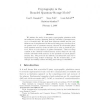21 search results - page 3 / 5 » On Unconditionally Secure Distributed Oblivious Transfer |
CCS
2009
ACM
14 years 8 months ago
2009
ACM
In this paper, we re-visit the problem of unconditionally secure message transmission (USMT) from a sender S to a receiver R, who are part of a distributed synchronous network, mo...
DAGSTUHL
2006
13 years 8 months ago
2006
It is well known that unconditionally secure bit commitment is impossible even in the quantum world. In this paper a weak variant of quantum bit commitment, introduced independent...
ASIACRYPT
2000
Springer
13 years 11 months ago
2000
Springer
The mobile agent is a fundamental building block of the mobile computing paradigm. In mobile agent security, oblivious transfer (OT) from a trusted party can be used to protect th...
ATAL
2005
Springer
14 years 1 months ago
2005
Springer
The aggregation of conflicting preferences is a key issue in multiagent systems. Due to its universality, voting has a central role among preference aggregation mechanisms. Votin...
FOCS
2005
IEEE
14 years 1 months ago
2005
IEEE
We initiate the study of two-party cryptographic primitives with unconditional security, assuming that the adversary’s quantum memory is of bounded size. We show that oblivious ...

